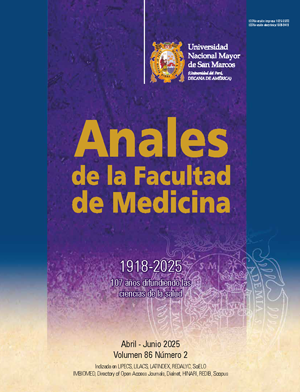Takotsubo cardiomyopathy in a patient with laryngeal squamous cell carcinoma
DOI:
https://doi.org/10.15381/anales.v86i2.30020Keywords:
Takotsubo Cardiomyopathy, Dyspnea, Heart Failure, Carcinoma, Squamous CellAbstract
Stress cardiomyopathy or Takotsubo syndrome is a clinical syndrome characterized by acute and transient systolic dysfunction, frequently related to a physical or emotional stressful event. Its clinical presentation is variable, and its prognosis depends on the severity of systolic dysfunction and associated comorbidities. We present the case of a 63-year-old patient with a laryngeal tumor who, after undergoing excision surgery, developed acute heart failure and an electrocardiogram compatible with acute myocardial infarction with ST-segment elevation. However, the elevation of troponins was discrete, that of NT-ProBNP was marked, and the coronary angiography was normal.
Downloads
Published
Issue
Section
License
Copyright (c) 2025 Mario B. García-Saavedra, Hilton Keennth D´janggo Cruz, Erick Gastón Torres Campos, Jorge Eleazar Bravo, Ricardo Bruno Arce Cano, Ángel Zamora Chuquisengo

This work is licensed under a Creative Commons Attribution-NonCommercial-ShareAlike 4.0 International License.
Those authors who have publications with this magazine accept the following terms:
- Authors will retain their copyrights and guarantee the journal the right of first publication of their work, which will be simultaneously subject to Creative Commons Attribution License that allows third parties to share the work as long as its author and its first publication this magazine are indicated.
- Authors may adopt other non-exclusive licensing agreements for the distribution of the version of the published work (eg, deposit it in an institutional electronic file or publish it in a monographic volume) provided that the initial publication in this magazine is indicated.
- Authors are allowed and recommended to disseminate their work over the Internet (eg: in institutional telematic archives or on their website) before and during the submission process, which It can produce interesting exchanges and increase quotes from the published work. (See El efecto del acceso abierto ).



